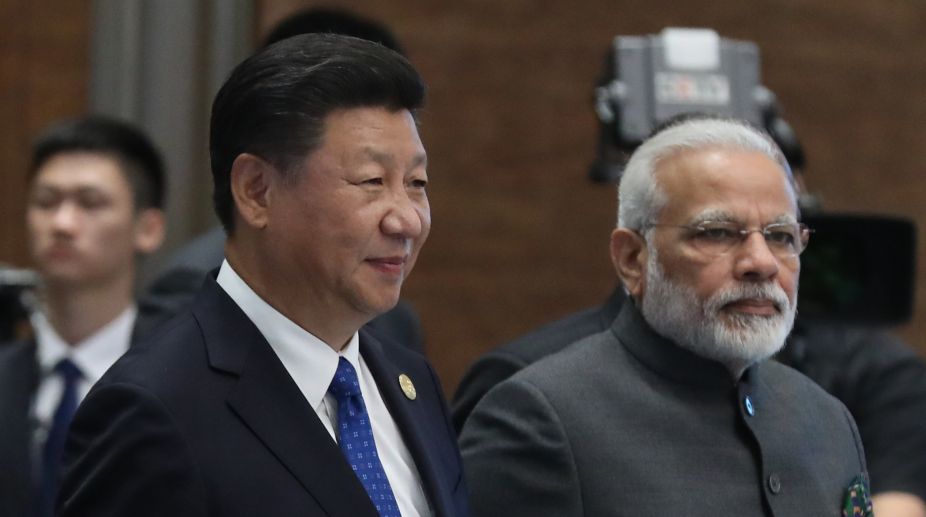In the Indian sub-continent where the two forthcoming regional players are locking horns over several issues, a curious chess board of bilateral relationships is unfolding.
India has cautiously played out its strategic stance over the recently retracted emergency situation in Maldives, while China went out upfront. In a similar deadlock, China has reportedly been engaged in infrastructural development in the Doklam region that continues to concern both the actors, India and Bhutan, pronouncedly involved in a protracted stand-off earlier.
While India continues to build its strategic benevolence to deal with China, moreover in a situation where Xi Jinping stands as the lifelong President of China, the latter has occupied greater limelight in the neighbourhood. It is rather interesting to survey the regional dynamics on this front, where the United States is not just a mere cog in the wheel.
President Donald Trump’s Asia policy has galvanized additional tension, primarily owing to his policy in Afghanistan and North Korea. With the latter, Trump has agreed to hold a historic summit which will in many ways shape US Asia policy, more likely with China, Japan and South Korea.
In this humdrum surrounding the region, what stands pre-eminent is the status seeking nature of both the US and China. In this fiasco, both the leaders, termed as extensively authoritarian, Donald Trump and Xi Jinping, are definitively shaping regional dynamics.
Trump unhindered approach towards North Korea’s nuclearisation saw a massive shift with the recent pronouncement to hold a bilateral conversation with the North Korean President, Kim Jong Un. In a way, this laid the path for peaceful engagement as opposed to outright contestation, that Trump was increasingly delving into.
While this meeting is not unprecedented, with two previous American leaders having met North Korean Leaders – President Jimmy Carter in 1994 and Secretary of State Madeleine K. Albright in 2000 – expectations from this dialogue are at the ultimate height.
Jimmy Carter’s meeting resulted in the signing of the Agreed Framework which halted the construction of two reactors by North Korea that could be used to produce fuel for nuclear weapons, while the Albright meeting extended the agreed framework to a greater extent.
Against this backdrop, President Trump is eager to establish the US’ predominance in the Asian region, ranging from Afghanistan to North Korea. This stance will greatly elevate the US strategic presence and status.
The US in this region is largely considered a hegemon that at times serves as the essential balancing actor. As an Australian white paper noted, the shift of power whereby China attempts to take over as the hegemon is of huge concern to the region.
Status can be defined as a socially constructed term that is largely shaped by a state’s global recognition most commonly adorned by the international platforms in the global realm.
Trump’s Asia policy in a similar vein has long been contested for taking up bold stances in established forums, including withdrawal from the Trans Pacific partnership and the Paris Agreement. In North Korea, therefore, Trump’s engagement serves as an essential step towards uplifting his status as a peacemaker in the region.
While earlier Trump himself criticised his Secretary of state, Rex Tillerson, for advocating negotiations with North Korea, describing plans for such negotiations as “a waste of time”, presently he is on his way to change his stance by declaring a historic summit with the North.
China, on the other hand, has a President for life in Xi Jinping who has held equal influence in the regional sphere and has challenged US hegemonic presence lately. In the Indian subcontinent, China has emerged as a heavyweight dominating many of the neighboring states in its region, and even in the Indian Ocean region.
Afghanistan for instance has, like North Korea, been in the eye of the storm for the longest period. Demanding constant interference of foreign actors, especially the US and Russia including others, the Afghan domestic scenario is a potpourri of regional and global actors who are keen to establish their dominance in the region.
India has the onus in this situation to uphold the strategic balance by making proactive foreign policy choices, largely concerning its small neighboring states, and to proliferate its status of a responsible actor when it comes to peace building in conflict-ridden sites.
The writer is a foreign policy analyst who writes on India’s superpower ambitions and nuclear policy. She has been associated with the Centre for Strategic Studies at Observer Research Foundation and Asia Council as a Policy Specialist.











